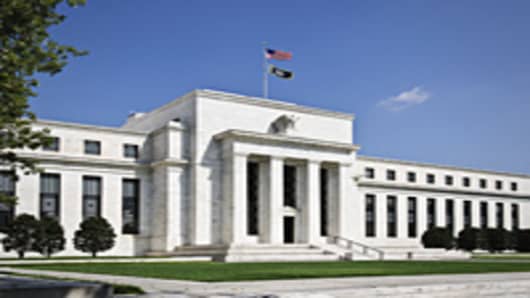As the Fed meets Tuesday, it has a few tools left to adjust monetary policy, but it is more likely to use words than fire power to soothe markets.
The Federal Open Market Committee is not likely to announce any major policy initiatives, at the conclusion of its regularly scheduled meeting. The decline in financial markets is viewed as too fresh for the Fed to react to in any major way, but it may comment about financial conditions and the economy.
"They've got a very cluttered balance sheet. The Fed doesn't have a lot of room, but I believe in this environment he (Fed chairman Ben Bernanke) has to say something. People don't feel inspired. There's a leadership vacuum," said Art Cashin, director of floor operations at UBS. "I think the problem is after what we saw last week (in Washington ) there's a growing fear here that if a great crisis erupted, geopolitical or otherwise, that these guys can't work together to get things done."
Stocks Tuesday were volatile out of the gate with a triple digit gain, following Monday's more than 6 percent sell off. The S&P 500, as of Monday was off 17 percent from its April high.
Confidence skidded along with stocks, and traders are looking for the Fed to inject some hope into markets. The S&P financial sector, down 10 percent Monday, was steady and slightly higher Tuesday morning, with a slight bounce back in Bank of America.
"I think the fact that Europe has been trading mostly negative today is telling me the equities markets are looking for something from the Fed and whatever they get from the Fed will likely be disappointing," said Deutsche Bank chief economist Joseph LaVorgna.
LaVorgna said the Fed has few options left. "I think what they should and will do is downgrade the growth outlook, downgrade the inflation run up and just say rates are going to stay where they are until the economy gets traction—essentially a downshifting of tone and that's it," he said. "Effectively there are no policy levers left."
What's the Fed to Do
Morgan Stanely interest rates strategist Jim Caron said the Fed does have a few steps it can take. One thing it could do would be to shift the duration of the Treasury securities it is currently holding on its balance sheet by using the proceeds of the roll downs in its mortgage portfolio to buy longer duration securities.
That purchasing power—about $15 billion a month—could be put towards buying 10-year notes, which would help keep those yields low, he said. "What people are talking about is what they call 'operation twist'where they buy longer dated securities," he said.
Caron said it would be a modified version of "operation twist," a Fed program from the 1960s that was used to raise short term rates in order to support the dollar while keeping long end rates lower to support the economy.
Economists have speculated the Fed could also reaffirm in its statement that it will hold rates low for an extended time, and it could also vow to keep its balance sheet extended, at nearly $3 trillion for a long period of time.
The Fed also could cut the interest rate on reserves from 0.25 percent to zero.
But it is not likely the Fed will embark any time soon on another quantitative easing program. The last QE program expired at the end of June, when the Fed wound down its purchases of $600 billion in Treasury securities.
"Not only is the economy deteriorating, not only are a lot of people pricing in a recession, but there is very little that people expect the fiscal and monetary authorities to do, if that indeed is the case. There's a real risk if we go into recession that the Fed doesn't have any more bullets," said Dan Greenhaus, chief global strategist at BTIG.
Amitabh Arora, head of asset allocation research at Citigroup, said the Fed will acknowledge market conditions in its 2:15 p.m. statement. "I think tomorrow it will be an assurance that they are monitoring things," he said.
Arora said it appears the markets are troubled by twin concerns, particularly when you look at the decline in the financial sector Monday. "I think that people are concerned about the financing markets and they are concerned there will be a forced deleveraging of the banking system because of the financing market. We have not seen any stress in the financing markets, yet," he said.
The other concern is that the economy is slowing. "Whether we see a snap back depends on why we sold off. If it's a growth reassessment, it's not going to snap back quickly," if the economy is deteriorating, he said. "If it's a concern about the financing markets, and there's not a problem after three or four weeks, it will snap back quickly, and I think it's the latter."
However, Arora points out that when growth slows in one quarter, it often stays slow in the next quarter. "Sharp declines in equities prices usually go hand-in-hand with subsequent declines in growth rates, not necessarily recession, but growth rates. Our growth index suggests growth was 0.5 to 1 percent for June and July. That's not a forecast. That's what the real time data suggests," he said.
Questions? Comments? Email us at marketinsider@cnbc.com



